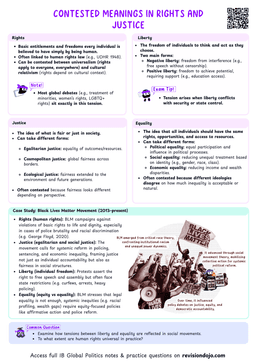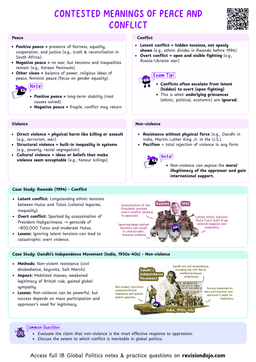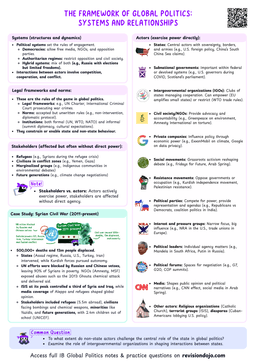Intergovernmental Organizations (IGOs)
Intergovernmental Organizations
Intergovernmental Organizations (IGOs) are formal institutions made up of two or more states that work together on common issues such as peace, security, trade, or the environment. They are established through treaties and operate under international law, meaning member states are legally bound by the organization’s rules.
- IGOs differ from non-governmental organizations (NGOs) in that they are composed of member states, whereas NGOs are typically independent entities driven by civil society.
Key Characteristics of IGOs
- Membership: Comprised of sovereign states.
- Legal Personality: Recognized as entities under international law.
- Decision-Making Structures: Governed by assemblies, councils, or committees.
- Specific Mandates: Focus on areas like security, trade, health, or environment.
The Role of IGOs in Global Politics
- Facilitating Cooperation: Provide platforms for dialogue and negotiation.
- Setting Norms and Standards: Establish rules and guidelines for state behavior.
- Conflict Resolution: Mediate disputes and promote peace.
- Providing Public Goods: Address global challenges like climate change and pandemics.
- The United Nations (UN) is a prime example of an IGO, with a broad mandate encompassing peace and security, human rights, and development.
Types of Intergovernmental Organizations
- Global IGOs: Have a worldwide membership and broad mandates.
- Example: United Nations (UN)
- Regional IGOs: Focus on specific geographic areas.
- Example: European Union (EU), African Union (AU)
- Functional IGOs: Address specific issues or sectors.
- Example: World Health Organization (WHO), World Trade Organization (WTO)
- While the UN is often seen as the most comprehensive IGO, regional organizations like the EU have significant influence within their specific areas.
The United Nations
- General Assembly: A deliberative body where all member states have equal representation.
- Security Council: Responsible for maintaining international peace and security.
- Economic and Social Council (ECOSOC): Coordinates economic and social initiatives.
- International Court of Justice (ICJ): Adjudicates legal disputes between states.
- The UN Security Council's role in authorizing peacekeeping missions highlights its unique power within the organization.
Strengths and Limitations
- Strengths:
- Global Legitimacy: Universality of membership.
- Comprehensive Mandate: Addresses a wide range of issues.
- Limitations:
- Veto Power: The Security Council's permanent members can block actions.
- Resource Constraints: Limited funding and reliance on member contributions.
- When analyzing IGOs, consider both their institutional strengths and the political dynamics that influence their effectiveness.
The European Union: A Regional Powerhouse
- Supranational Elements: Institutions like the European Commission have authority above the national level.
- Single Market: Facilitates free movement of goods, services, capital, and people.
- Common Policies: On trade, environment, and human rights.
- The EU's response to the 2008 financial crisis, through mechanisms like the European Stability Mechanism, illustrates its capacity for economic governance.
Challenges
- Divergent National Interests: Balancing the priorities of 27 member states.
- Democratic Deficit: Criticisms of a lack of transparency and accountability.
- The EU's handling of the 2015 migration crisis revealed tensions between member states over border control and asylum policies.
The World Trade Organization: A Functional IGO
Core Functions
- Trade Negotiations: Facilitates multilateral trade agreements.
- Dispute Resolution: Provides a mechanism for resolving trade conflicts.
- Monitoring and Enforcement: Ensures compliance with trade rules.
- The WTO's role in mediating trade disputes between the US and China highlights its importance in maintaining global economic stability.
Criticisms
- Inequality: Accusations that its rules favor wealthier nations.
- Decision-Making: Consensus-based approach can lead to gridlock.
- The Doha Round of trade negotiations stalled due to disagreements between developed and developing countries, illustrating the challenges of consensus-based decision-making.
The Impact of IGOs on State Sovereignty
- Enhancing Cooperation: IGOs enable states to address transnational issues that no single country can tackle alone.
- Eroding Sovereignty: Critics argue that binding agreements and supranational institutions can limit national autonomy.
- The tension between state sovereignty and global governance is a central debate in international relations. While IGOs can constrain state actions, they also provide mechanisms for collective problem-solving.
The Future of Intergovernmental Organizations
- Adapting to New Challenges: IGOs must evolve to address issues like cybersecurity, climate change, and pandemics.
- Balancing Power Dynamics: Ensuring equitable representation and decision-making remains a critical challenge.
- Identify three key functions of intergovernmental organizations and provide examples of each.
- How do IGOs balance the tension between state sovereignty and global cooperation?
- What are the strengths and limitations of regional IGOs compared to global ones?


